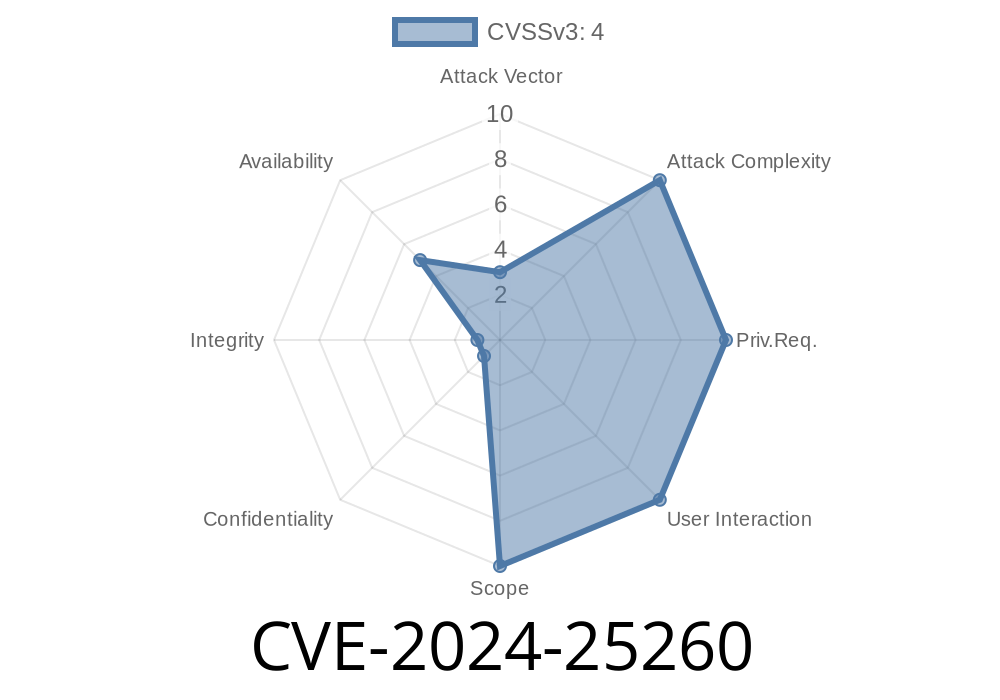In early 2024, a security vulnerability cataloged as CVE-2024-25260 was discovered in the popular open-source tool elfutils, specifically in version .189. This vulnerability is a NULL pointer dereference in the handle_verdef() function found inside the readelf.c file. While this might sound technical, the bottom line is: *an attacker can trick the program into crashing, and—under certain circumstances—use this crash to execute arbitrary code or cause a denial of service*.
In this deep-dive, we'll break down what CVE-2024-25260 is, walk through easy-to-understand code examples, discuss how the vulnerability is triggered, and give you direct links for more information. If you're an engineer, hobbyist, or sysadmin, keep reading.
What is elfutils?
elfutils is an open source set of tools and libraries for handling files in the Executable and Linkable Format (ELF)—the standard binary format for Linux. The readelf utility within elfutils is frequently used for analyzing the contents of ELF files.
The culprit of CVE-2024-25260 lies in the function
static void
handle_verdef(struct readelf *re, GElf_Shdr *shdr, Elf_Data *data) {
// ... some code ...
Verdef *def = data->d_buf;
while (...)
// acts on the 'def' object
}
In elfutils v.189's readelf.c, handle_verdef() does not check if data->d_buf is NULL before using it. If an attacker supplies a malicious or corrupted ELF file that causes data->d_buf to be NULL, then dereferencing this pointer will crash the program.
*Crashes* like this are bad. Even worse, in some rare configurations, an attacker could also execute code or escalate privileges depending on how the rest of the software stack is set up.
Original Reference
- CVE-2024-25260 at NVD
- Upstream elfutils Bug #30803
- elfutils Commit Fix
Minimal Proof-of-Concept (PoC) Exploit
You can exploit this vulnerability by feeding a specially crafted ELF file to the readelf command. Below is a minimal PoC based on public reports:
PoC:
# Create a zero-byte file, which is not a real ELF, but triggers the bug
touch bad.elf
readelf --version-info bad.elf
This may generate the following error (output/behavior may vary)
Segmentation fault (core dumped)
A more "sophisticated" attack could involve crafting an ELF file where the section table is present, but sh_offset or section pointers would cause readelf to fail loading section data, letting Elf_Data and its d_buf stay as NULL.
C-like pseudo-code to demonstrate crash
Elf_Data *data = elf_rawdata(scn, NULL);
if (data) {
// BAD: No check if data->d_buf is NULL here
handle_verdef(..., data);
}
The Patch (How Was It Fixed?)
The fix is simple: *Check if data->d_buf is not NULL before using it.*
Patched code snippet
if (data && data->d_buf != NULL) {
Verdef *def = data->d_buf;
// continue as normal...
} else {
// handle the error, print warning, etc.
}
By adding this check, you prevent the dereference if the buffer isn’t set (e.g., the ELF file is corrupt).
Impact: Denial of Service (DoS); potential for code execution in rare, advanced use cases.
- Who’s affected: Anyone running elfutils v.189 and using readelf or tools that parse untrusted ELF files.
- Exploitability: Easy to trigger with corrupted or crafted ELF files; easy to detect (as a crash).
Upgrade elfutils: Use the patched version (.190 or later).
Use input validation: Don't run readelf on untrusted files, especially in automated workflows.
- Sandbox where possible: Consider running analysis tools like readelf in a sandbox or container, limiting exposure even if a crash or exploit is triggered.
Summary
CVE-2024-25260 is a simple but dangerous bug in elfutils v.189: dereferencing a NULL pointer in handle_verdef() due to missing sanity checks. Attackers can exploit this with a bad ELF file, crashing your tool—and, in complex cases, leverage the crash for further attacks.
If you use elfutils, *update now*. For more details, see the original references
- National Vulnerability Database entry
- elfutils upstream bug report
- Official patch commit
Timeline
Published on: 02/20/2024 18:15:52 UTC
Last modified on: 08/01/2024 13:47:38 UTC
